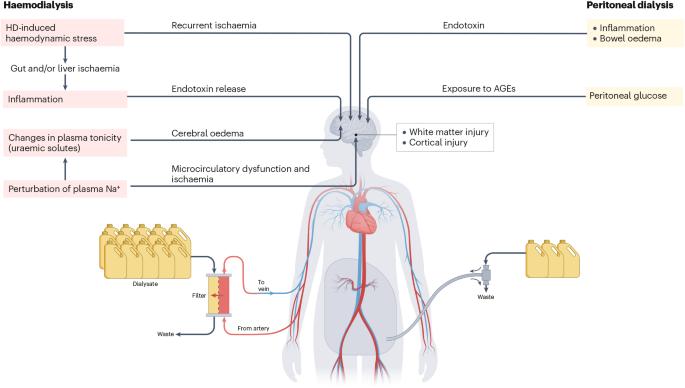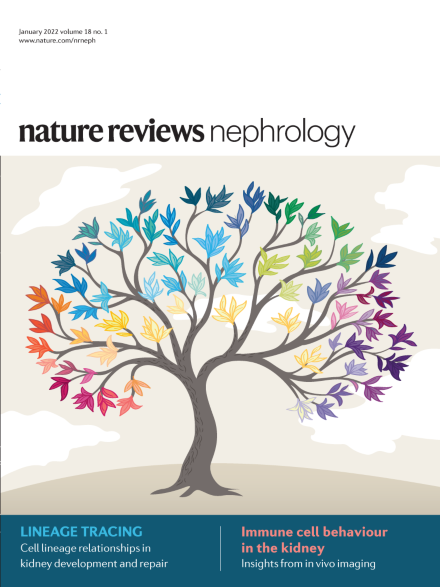Dialysis and cognitive impairment
IF 39.8
1区 医学
Q1 UROLOGY & NEPHROLOGY
引用次数: 0
Abstract
People with chronic kidney disease who require maintenance dialysis characteristically experience accelerated and aggravated cognitive decline compared with those with advanced kidney disease who are not receiving this form of kidney replacement therapy. This effect is inadequately appreciated, but of crucial importance to patients, their carers and the health-care systems that support them. Although many of the comorbid conditions prevalent in this patient population have the potential to affect brain structure and function, an evolving body of evidence indicates that the dialysis therapy itself has a central role in the pathophysiology of progressive cognitive impairment. Both haemodialysis and peritoneal dialysis are associated with structural and functional changes in the brain that can lead to characteristic short-term symptoms, such as headache, confusion, delirium and brain fog, as well as long-term reductions in cognitive functional ability. Here, we explore the mechanisms, both established and putative, underlying these effects and consider approaches to addressing this issue with both single and complex therapeutic interventions. Treatment with dialysis in people with kidney failure has been implicated in accelerated cognitive impairment. Here, the authors consider how dialysis treatment — haemodialysis and peritoneal dialysis — can promote cerebral injury and might exacerbate chronic kidney disease-associated brain alterations and cognitive decline.


透析和认知障碍
需要维持性透析的慢性肾脏疾病患者与未接受这种肾脏替代治疗的晚期肾脏疾病患者相比,其认知能力下降的速度加快和加重。这种影响尚未得到充分认识,但对患者、其护理人员和支持他们的卫生保健系统至关重要。尽管在这一患者群体中普遍存在的许多合并症有可能影响大脑结构和功能,但越来越多的证据表明,透析治疗本身在进行性认知障碍的病理生理学中起着核心作用。血液透析和腹膜透析都与大脑的结构和功能变化有关,这些变化可导致特征性的短期症状,如头痛、精神错乱、谵妄和脑雾,以及长期认知功能能力下降。在这里,我们探讨了这些影响的机制,包括已建立的和假定的,并考虑了通过单一和复杂的治疗干预来解决这一问题的方法。
本文章由计算机程序翻译,如有差异,请以英文原文为准。
求助全文
约1分钟内获得全文
求助全文
来源期刊

Nature Reviews Nephrology
医学-泌尿学与肾脏学
CiteScore
39.00
自引率
1.20%
发文量
127
审稿时长
6-12 weeks
期刊介绍:
Nature Reviews Nephrology aims to be the premier source of reviews and commentaries for the scientific communities it serves.
It strives to publish authoritative, accessible articles.
Articles are enhanced with clearly understandable figures, tables, and other display items.
Nature Reviews Nephrology publishes Research Highlights, News & Views, Comments, Reviews, Perspectives, and Consensus Statements.
The content is relevant to nephrologists and basic science researchers.
The broad scope of the journal ensures that the work reaches the widest possible audience.
 求助内容:
求助内容: 应助结果提醒方式:
应助结果提醒方式:


